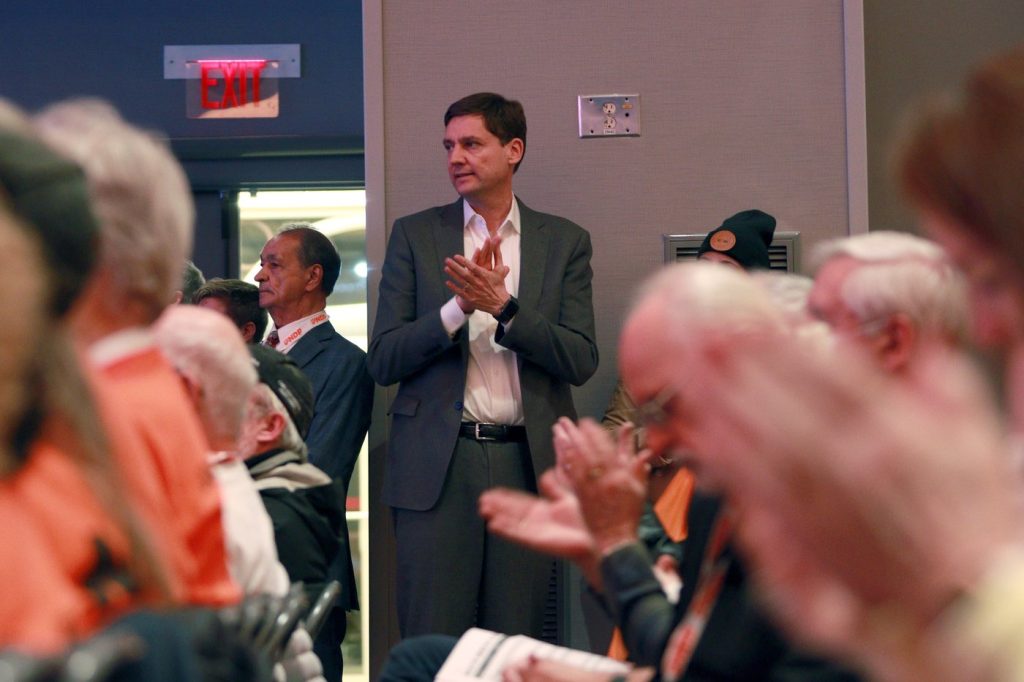VICTORIA – British Columbia Premier David Eby is seeking a strong endorsement at the NDP's convention in Victoria this weekend, aiming for a "healthy majority" similar to the 93 percent approval he received from delegates two years ago. However, Eby faces challenges as the NDP secured a slim majority with just one seat to spare in the 2025 provincial election, while also experiencing erosion of support from First Nations and labor unions.
At a news conference prior to the convention, Eby expressed his desire for comprehensive support from NDP members. "Obviously, I want a healthy majority – obviously, I want 100 percent – but a healthy majority and support for the hard work going ahead," he stated. Following last year's election results, where the New Democrats won 47 seats, the BC Conservatives captured 44 seats, and the Green Party secured two, the dynamics within the party are under scrutiny as the convention approaches.
The timing of the convention is significant, coming just after the conclusion of the longest public service strike in B.C. history. The British Columbia General Employees Union (BCGEU), which represents many workers, accepted a contract after an eight-week strike amid government claims of financial constraints. BCGEU President David Finch had voiced concerns over the NDP's commitment to labor, reflecting broader tensions as other unions, including those for teachers and nurses, also face expired contracts.
Further complicating the relationship between the NDP government and organized labor, the BC Ferry and Marine Workers’ Union criticized BC Ferries for contracting a shipyard owned by the Chinese government to construct new vessels. Provincial President Eric McNeely noted that relations with the NDP are currently "a bit troubled," emphasizing the importance of recognizing the contributions of the over half a million unionized workers in B.C. He warned that while labor may not directly decide elections, they can have a significant impact on their outcomes.
Political observers, like UBC lecturer Stewart Prest, anticipate that Eby will encounter a more vocal response from party members at this convention compared to two years ago. Prest suggested that Eby might receive pointed questions regarding the NDP's challenges in distinguishing itself from the Conservatives, despite the latter's internal strife. There is speculation about the financial sustainability of the NDP's investments in housing, health, and education, especially in light of significant budget deficits and economic concerns.
Prest highlighted the importance of Eby achieving a leadership endorsement above the 75 percent threshold, noting that anything below that could lead to increased scrutiny of his leadership. He remarked that Eby is likely to make efforts to mend relationships with organized labor while navigating the party's dealings with environmentalists and First Nations, who may feel sidelined by the government's focus on economic growth through natural resource projects.
This tension has been exacerbated by the recent passage of Bill 14 and Bill 15, which aimed to expedite natural resource projects without sufficient consultation with First Nations. Robert Phillips from the First Nations Summit remarked on the frustration among leaders regarding the lack of consultation, while also recognizing that there are opportunities for collaboration on major projects.
The convention also occurs against the backdrop of the Cowichan Tribes Aboriginal title case, where a B.C. Supreme Court ruling has affirmed the Cowichan Tribes' title over specific lands, prompting concerns about its implications for private land ownership. Eby has acknowledged the uncertainty created by this ruling but committed to protecting private property rights as the provincial government plans to appeal the decision.
As the NDP gathers in Victoria, the outcome of this convention is set to be pivotal, shaping the future direction of the party and its relationship with crucial stakeholders, including labor unions and First Nations. Eby’s ability to navigate these challenges will be closely monitored as he seeks to maintain his leadership and the party's unity in a complex political landscape.











